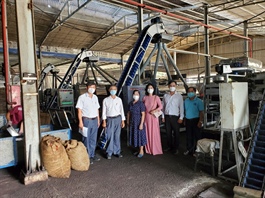Dong Nai promotes supporting industry development
Dong Nai promotes supporting industry development
Dong Nai’s supporting industries have made impressive progress in recent years, but more needs to be done to further develop them.

Nguyen Hoang Quyen, head of the province's industrial management sub-department, said Dong Nai is home to more than 600 supporting industry companies, primarily in the garment and textile, footwear, electronics, and mechanical engineering sectors, that provide jobs to more than 158,000 people.
Supporting industry products accounted for more than half of the province’s total industrial product exports, she said.
According to experts, foreign companies in Viet Nam are increasingly looking to source components and parts locally to reduce costs and minimise risks caused by supply chain disruptions.
They also seek to increase the use of local parts to enjoy tariff preferences provided under free trade agreements the country has signed.
The province has become one of the country’s major supporting industry hubs, meaning its products are inputs for other enterprises, according to its People's Committee.
Nguyen Thi Hoang, deputy chairwoman of the Dong Nai People's Committee, said: "This year the province has strengthened trade promotion to connect foreign and local enterprises so that they can supply products to each other. Many enterprises have found domestic sources of supply, reducing imports.”
But of the total number of supporting industry enterprises, more than 80 per cent are foreign, according the Department of Industry and Trade.
Local firms are still struggling because of limitations with respect to funding, technology, human resources, and skills, it said.
Besides, Vietnamese participation in the value chain of foreign enterprises’ manufacturing industries remains modest, it said.
Speaking at a working session between the Viet Nam Industry Agency under the Ministry of Industry and Trade and the department recently, Pham Tuan Anh, the former’s deputy director, said it is implementing a national programme to develop supporting industries.
So far, businesses benefiting from it have made excellent progress, he said.
Tuong Lai Company Limited in Long Thanh District, for instance, has joined the programme and become a supplier for a global value chain, he said.
His agency is working with the department to appraise another firm to enable it to join the programme, he said.
He suggested the province develop clear and focused policies to better mobilise resources for the development of the industry.
In future, his agency, the department and other related authorities would regularly exchange information and co-ordinate to roll out support policies to promote the development of supporting industries, he said.
A representative of a local supporting industry company said if there are good support policies, the Vietnamese supporting industry would not be any inferior to their foreign counterparts.
Foreign enterprises have demand for supporting industry products, but local firms find it hard to reach them and also have to compete with foreign supporting industry enterprises, he said.
Local firms need support from government agencies to meet, communicate and co-operate with major foreign manufacturing firms, he added.
The southern province has adopted policies to develop supporting industries, which are considered the backbone of the manufacturing sector and an important factor in attracting foreign manufacturing firms.
Dong Nai’s goals for supporting industries development include 21-23 per cent of its total industrial production coming from them by 2025.
It also plans to complete the database of enterprises in the industry to help link them up with those making finished products.
It plans to develop more supporting industry zones and clusters along with incentive policies, especially policies on finance, tax, and technical and management support.






















